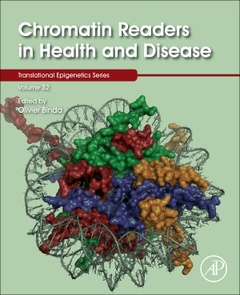Chromatin Readers in Health and Disease Translational Epigenetics Series

In the book, more than a dozen leaders in the field examine a range of protein readers, their relationship to human disease, and the early therapeutics that act as chromatin signaling factors to treat cancers and Huntington's disease, among other disorders.
2. BAH
3. BIR
4. BRCT Domains as Chromatin Readers: Structure, Function, and Clinical Implications
5. The bromodomain acyl-lysine readers in human health and disease
6. Chromodomains
7. CW-type zinc fingers
8. Macrodomains and PAR readers
9. MBT
10. PHD and double PHD finger
11. PWWP
12. SPIN repeats and human pathologies
13. Tudor and TTD
14. UDR and Ubiquitin
15. WD40
16. YEATS
17. Multivalent readers and interplay among different readers
18. DNA Methylation and Reader- or Writer-Proteins: Differentiation and Disease
19. R-loops readers
20. CUT&RUN and CUT&Tag: Low-input methods for genome-wide mapping of chromatin proteins
Dr. Olivier Binda is a Researcher at the University of Ottawa, specializing in epigenetics and gene expression as it relates to human diseases. Dr. Binda co-edited Chromatin Signaling and Diseases (Elsevier 2016), a volume in Elsevier’s Translational Epigenetics series, and has published 20 scientific papers in such peer reviewed journals as the Molecular Cell, Journal of Biological Chemistry, Biochemistry, Epigenetics, Oncogene, Scientific Reports, and Stem Cell Research. In past positions he has served as a postdoctoral fellow at McGill University and Stanford University, and he completed his PhD in Biochemistry at McGill University in 2007.
Affiliations and expertise
University of Ottawa, Department of Cellular and Molecular Medicine, Ottawa, CANADA.
Dr. Tollefsbol is a Distinguished Professor of Biology and a Senior Scientist in the O’Neal Comprehensive Cancer Center, Integrative Center for Aging Research, Nutrition Obesity Research Center, University Wide Microbiome Center, and the Comprehensive Diabetes Center at the University of Alabama at Birmingham (UAB). He is Director of the UAB Cell Senescence Culture Facility which he established in 1999. Dr. Tollefsbol trained as a Postdoctoral Fellow and Assistant Research Professor with members of the National Academy of Science at Duke University and the University of North Carolina. He earned doctorates in molecular biology and osteopathic medicine from the University of North Texas Health Sciences Center and his bachelor’s degree in Biology from the University of Houston. He has received prior funding from the NCI, NHLBI, NIMH and other federal institutes as well as the Glenn Foundation for Medical Research, Susan G. Komen for the Cure, the American Federation for Aging Research (AFAR), and the American Institute for Cancer Research (AICR) among many other sources.
- Enables researchers and clinicians to understand chromatin signaling mechanisms that regulate gene expression through chromatin readers
- Highlights the role of chromatin readers in a variety of human pathologies, as well as early therapeutics that act on chromatin signaling
- Includes chapter contributions from international leaders in the field
Date de parution : 09-2023
Ouvrage de 420 p.
19x23.4 cm



